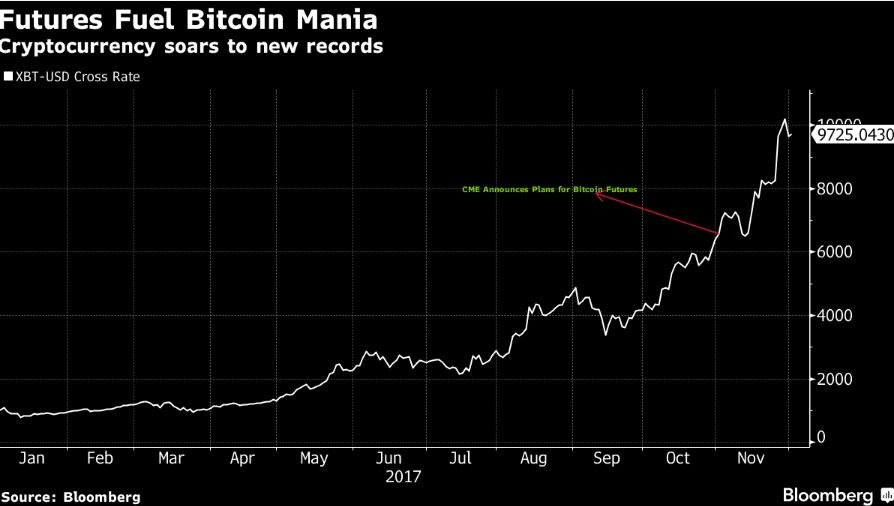Bitcoin heads to Wall Street whether regulators are ready or not
By Rob Urban and Ben Bain
Two US exchanges, including the parent of the venerable Chicago Mercantile Exchange, are racing to embrace bitcoin, dragging federal regulators into a realm skeptics call a fad and fraud.
The development shows how some big financial players are moving to co-opt the volatile cryptocurrency and lure more mainstream investors into the market, even before regulators have agreed on just what bitcoin is.
CME Group Inc.’s contracts will debut December 18. Cboe Global Markets Inc. didn’t announce a start date. Both got the green light Friday after going through a process called self-certification -- a pledge to the US Commodity Futures Trading Commission that the products don’t run afoul of the law. The news pushed bitcoin’s price higher.
The moves are a watershed for Wall Street professionals -- including institutional investors and high-speed traders -- who’ve been eager to bet on cryptocurrencies and their wild swings, but worried about doing so on mostly unregulated markets. The new products are subject to CFTC oversight. CME, Cboe and Cantor Fitzgerald LP’s Cantor Exchange -- which is creating another kind of bitcoin derivative, binary options -- promised to help the agency surveil the underlying bitcoin market.Trading in bitcoin and other cryptocurrencies is largely unregulated, and that’s the point. Bitcoin was introduced in the wake of the 2008 financial crisis as a way of avoiding governments and central banks. Now with its meteoric rise and the proliferation of cryptocurrencies, banks, brokers and mainstream investors want in. And they want regulation, something they’ll get plenty of in a market like CME or Cboe’s.
“The launch of the futures will actually make the market healthier,” Cboe President Chris Concannon said in an interview after the news broke Friday. “It will create pricing equilibrium in the market. Clients who are holding bitcoin now have no way to hedge their risk. These products allow them to hedge, and to take opposing views. More importantly, it brings a wave of regulatory oversight.”
Regulators’ Struggle
US financial regulators have struggled for years to agree on what, exactly, bitcoin is and what risks it might pose. That’s left its enthusiasts and financial professionals unsure which government agencies might try to police the rapidly growing market. In addition to the CFTC, there’s the Securities and Exchange Commission, the Internal Revenue Service and the Treasury Department’s FinCEN, which tracks illicit payments.
The CFTC declared in 2015 that it would treat bitcoin as a commodity. “But the IRS says it’s property, the SEC said now some digital currency is a security, and FinCEN says digital currency is a ‘money-like instrument,’” said Adam White, general manager of GDAX, a cryptocurrency exchange owned by Coinbase. His company is trying to work with all of them, he said, while offering his own definition: “It’s a new asset class.”
After Friday’s announcement, exchanges and the CFTC will have to keep tabs on that underlying market, according to Jeff Bandman, who until June advised Chairman Giancarlo on financial technology issues.
“It’s well understood that bad actors can take actions in the spot market for a commodity where the reward or payoff is the derivatives market and vice versa,” Bandman, who now runs Bandman Advisors, said in an interview before Friday’s announcement. “This would represent a new opportunity for mischief.” 